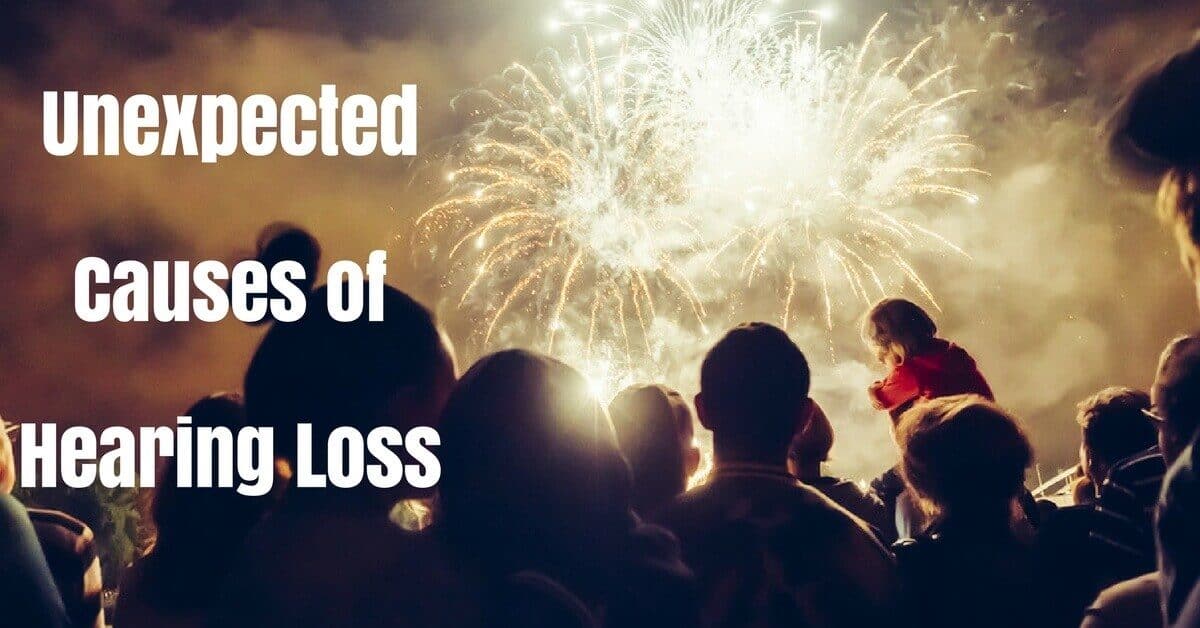Have you ever woken up the morning after an amazing performance by your favorite band, only to hear a high-pitched ringing in your ears? Have you griped about incessant construction noise down the street that wakes you up every morning?
As we make our way through our days, there are moments in which we experience sounds that are definitely harming our hearing. There are other moments, too, in which our hearing may be unexpectedly damaged without us recognizing the consequences until years later. If we are more aware of these unexpected causes of hearing loss, we may begin to take steps to protect our hearing whenever we can.
Noise-Induced Hearing Loss & Dangerous Decibels
Noise-induced hearing loss is one of the most common forms of hearing loss (the other one being presbycusis, or age-related hearing loss). The accumulation of a lifetime of exposure to loud noises, whether through work or play, has an adverse effect on one’s hearing health.
All sounds may be measured in decibels. A normal conversation tends to occur at 60 decibels, which is not loud enough to cause hearing loss. However, an idling construction vehicle creates sounds at 85 decibels, which could cause permanent hearing damage after an eight-hour work day. Hearing specialists tell us that any sounds over 85 decibels, when experienced for a period of eight hours, can cause permanent damage to our hearing. If the sounds are louder than 85 decibels, then it takes less time for our hearing to be damaged.
Sounds louder than 85 decibels pose the greatest risk to our hearing. If the noise is related to your employment, consider having a discussion with your human resources department. For the most part, construction workers and airport employees are outfitted with personalized ear protection equipment. However, for people who play music for a living, or DJ at a nightclub, the protection of one’s hearing is often not considered a priority. In these settings, sound systems could rise to produce noise over 110 or 120 decibels.
The use of earplugs could make a big difference in preventing hearing loss, especially when you are exposed to loud decibels on a regular basis.
Unexpected Causes of Hearing Loss
Aside from these scenarios where loud sounds are a given, there are moments in our everyday life with bursts of sound that could unwittingly damage our hearing. Whether it is the constant use of a hair blow-dryer, or a weekly tending of the yard with the lawnmower, or even the infrequent, do-it-yourself construction projects with power tools and the annual fireworks display on Independence Day, these moments add up over the years. The use of earplugs or protective over-the-ear gear in these moments is recommended to prevent small levels of damage.
For those of us who live near airports or in urban environments near public transportation hubs or heavy traffic, these everyday sounds have become a part of the tapestry of our lives. We’ve grown accustomed to the racket of a subway train rolling through a station or the honking of cars at rush hour. Researchers have recommended taking “noise diets” – moments where we sequester ourselves to a quiet place to take a break from the onslaught of loud sounds in our lives. These moments offer respite for our ears – and more often than not, these quiet moments have been found to reduce levels of stress and anxiety in our bodies as well.
Often times, in the midst of this ruckus, we’ve depended on our earbuds or headphones to drown out noise and comfort us with music. With the advent of portable music-playing technology in the past few decades, commuters tend to wear headphones on buses and trains. Researchers have recommended the use of noise-canceling, over-the-ear headphones in these circumstances; it is better to cancel out extraneous noise in order to hear your music than it is to turn up the volume. Earbuds are ineffective at canceling out noise, and as a result, we crank the volume even higher on our devices in order to hear the music, which causes harm to our hearing.
Overall, for those of us who depend on hearing aids or earbuds every day, it is important to follow the 60-60 rule recommended by hearing specialists: listen to your media at 60% of the volume for no more than 60 minutes at a time.
Visit us at My Hearing Centers
Have you experienced changes in your hearing? Are you concerned about the noise levels in your life? Visit us at one of our My Hearing Centers locations for a comprehensive hearing test today.


